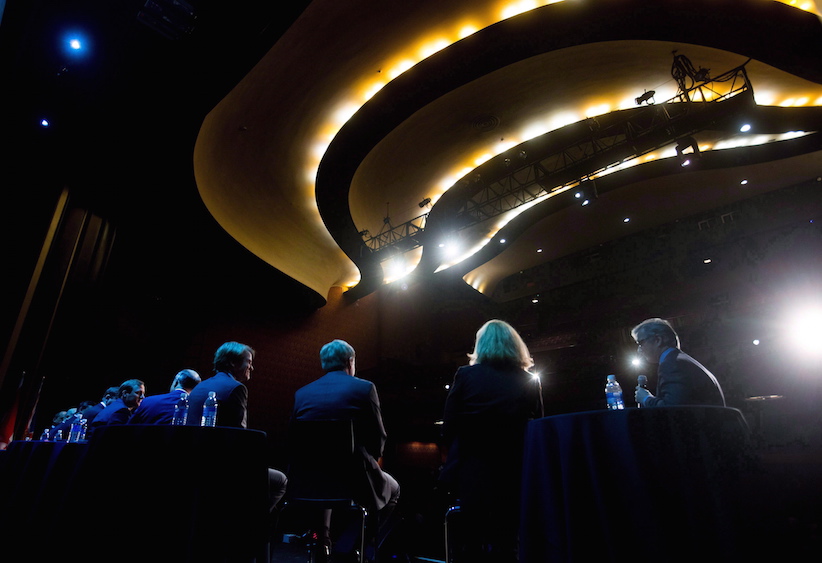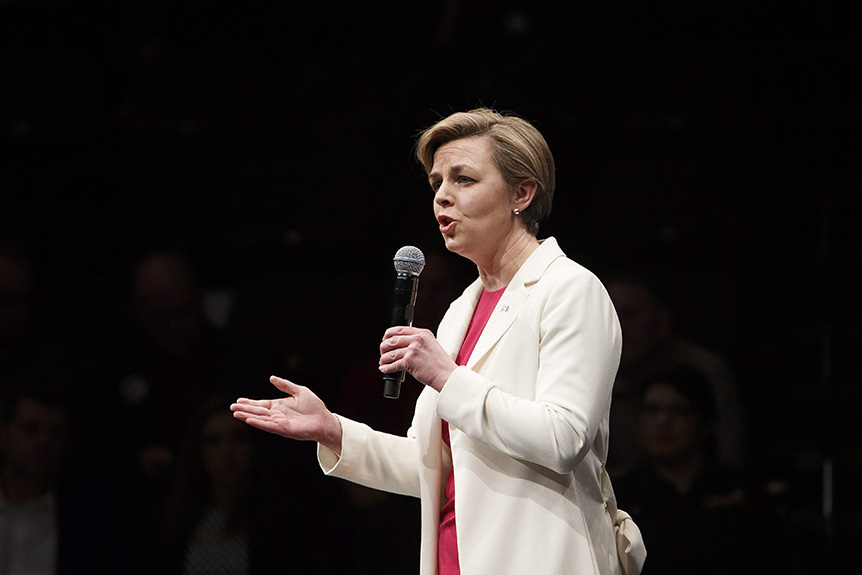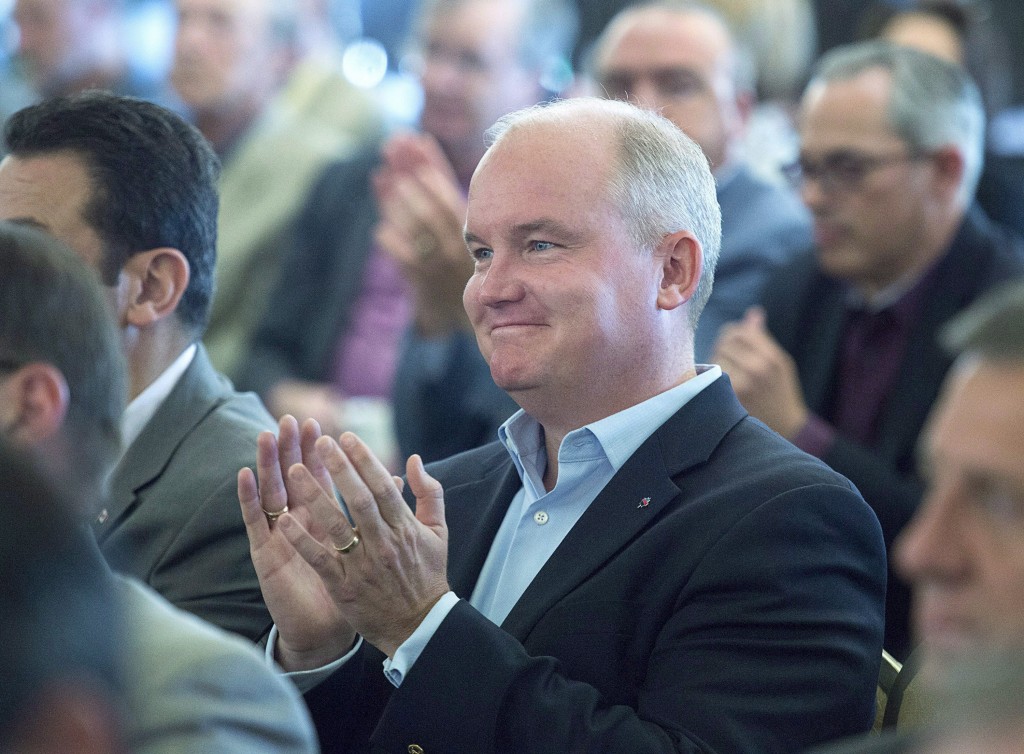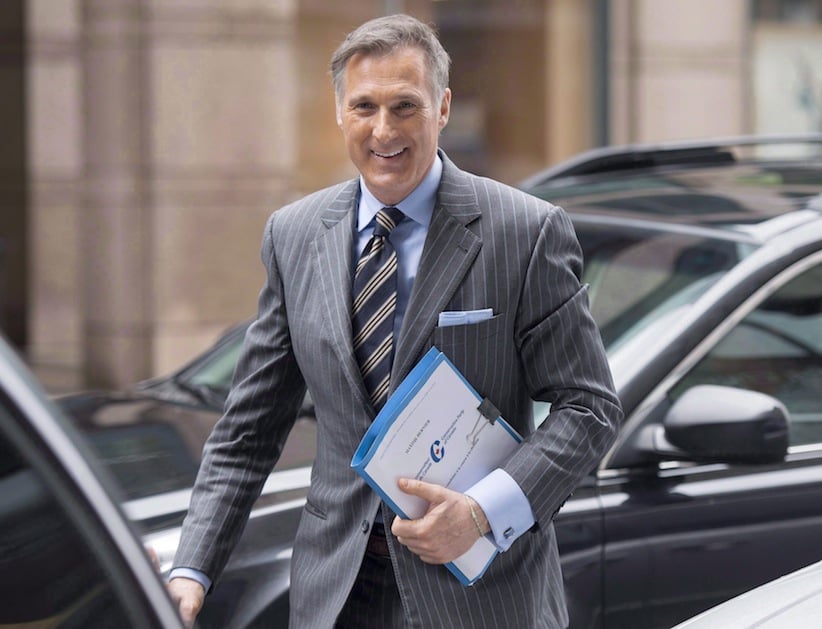The Tory leadership race wears on—yet the work has barely begun
The Conservatives will surely survive their leadership race, says Paul Wells. But everything else isn’t so clear.
Share

They’re punch-drunk now, with seven gruelling weeks still ahead before they know which of them will lead. They operate mostly on muscle memory and sorely depleted adrenaline stocks. A leadership campaign is a marathon, and surely by now you’d have thought more of the legions competing to lead the Conservative Party of Canada would have collapsed and dropped out. Yet they persist. Doggedness is a virtue in politics, hardly the only virtue but one of them, and this field has it.
Thirteen of them showed up Sunday at the Eglinton Grand, an art deco movie house in what used to be Joe Oliver’s riding. (Kevin O’Leary, a television pitchman with a powerful homing instinct, was once again in Miami, celebrating a wedding anniversary. He had confirmed he’d be at the Eglinton Grand, and as late as Saturday was still expected.) The occasion was an off-league debate organized by Oliver, who was the minister of natural resources, and then of finance, in Stephen Harper’s late governments. Oliver lost to a Liberal in 2015, as did every Conservative and New Democrat within Toronto’s city limits. Since then Oliver has sought, and lost, a provincial Conservative nomination, and now writes gloriously ill-tempered columns for the National Post and the Toronto Sun. He was 71 when first elected to Parliament, not much older when first ejected, and he plainly misses it.
But he resisted the temptation to let any part of the afternoon be about him. He put big questions in plain language—on relations with the United States, on immigration and asylum claimants, on housing prices and other broad topics—and let the candidates produce the drama.
They are less and less shy about obliging. The party faces “a very, very stark choice,” Michael Chong told the crowd. If it picks a leader who “plays to fear and prejudice,” it will “hand the Liberals majority governments for a generation to come.”
This call to moderation generated pretty good applause. And I saw a surprising number of Chong buttons in the crowd. But there was comparable applause for Kellie Leitch, the plain object of Chong’s “stark choice,” when she took a question on the asylum seekers who’ve lately crossed the border in Manitoba and Quebec.
“I’ve been speaking about our Canadian identity since September of last year,” she said. “One grounded in a set of values: hard work, generosity, freedom and tolerance. ….I believe strongly that if we have individuals illegally entering the country and we have mayors who have decided to harbour them, that those mayors should not receive federal tax dollars. And I’ve been clear on that.”
That sounded pretty good to a lot of the people at the Eglinton Grand. It was a decent crowd, perhaps 300 people, varied in age, multi-ethnic, maybe 70 per cent male. It was hard to discern a crowd favourite. They, and tens of thousands of Conservatives more or less distant from Toronto, have much to consider.

I happen to think this has been a pretty good leadership contest for the Conservatives. There is no evidence whatever of a clean division along the old “Red Tory” and “Reform/Alliance” fault lines, the sort of split that would threaten an undoing of the modern Conservative Party’s 2004 founding. Anyone who claims to fear or desire such a division would do well to pop by one of these leadership debates.
No, the divisions on offer here were harder to predict or map, and followed different contours on different questions. Just about all the candidates, with the possible exception of Chong, call for tougher enforcement at the border against the asylum seekers in Manitoba and Quebec, for example. Even here there are differences. Chris Alexander, the former immigration minister who’s been on every side of immigration questions, called for a suspension of the safe third country agreement with the United States, putting him squarely in agreement with the NDP on the issue.
Candidates who favour a harder line (hello again, Kellie Leitch) find themselves harshly policed by a combination of simple reality and the other candidates. “I’m advocating a common-sense idea,” she said at one point: “That we interview each immigrant, refugee and visitor coming to Canada and talk to them about our Canadian values. Those values that built this country.”
She keeps saying “visitor.” We must assume she means it. There were about 16 million visits to Canada lasting at least overnight in 2015, if we count only the top 15 countries of origin. Interviewing each of those visitors for 30 seconds would take 15 years.
But you don’t need me to make fun of Leitch; the other leadership candidates were eager to volunteer. “Who are Kellie’s little group of bureaucrats who’ll decide what the values are?” Vancouver businessman Rick Peterson asked, thus earning the loudest applause of the afternoon.
Deepak Obhrai won the biggest gale of laughter when he tried to imagine what Leitch’s entry interviews would be like. Hard work? “We all come here to work hard. We don’t have to be told, ‘You come here to work hard.’ That’s why we came here. To sit there while somebody says, ‘Are you going to go to Canada to work hard?’ Excuse me? What nonsense is that?”
MORE: The beginning of the end of the Tory race—but for whom?
I learned a lot of surprising things. Peterson wants to increase the GST to 9 per cent to fund cuts to income taxes and corporate taxes. Steven Blaney, who seems to believe he’s a serious candidate, wants to boost shipbuilding in Newfoundland by commissioning a fleet of nuclear submarines. Lisa Raitt thinks one of the biggest problems facing Canada in the years ahead will be the return of American attempts to charge “a levy for every (shipping) container coming into the United States through one of our two ports. That, my friends, is going to be coming at us once again. And I have no faith in the drama club that’s currently running student council to actually stand up and do something about it.”
Perhaps because of limited time, Raitt did not explain how she’ll do better against such protectionist measures. Perhaps she will tell the Yankees she was never in drama club.

Erin O’Toole, whose support seems to have grown from a very modest start since this race began, wants to give college and university graduates a $100,000 basic personal exemption once they finish school, which they can use to keep their tax bill low while they find their feet in the world.
“The great thing about it is, it’s all costed, believable and achievable,” O’Toole said of his plan. Unlike others’, cough cough. “My friend Max, when asked by the Globe and Mail about his plan, he said, ‘I didn’t do the math.’ If that is the response during an election, we would lose the election that day.”
His friend Max is, of course, Max Bernier, who jumped in to protest, “I did do the math.” Bernier wants to cut just about every tax known, “end corporate welfare,” privatize some stuff, and basically get the federal government out of much of what it’s done for decades. He has been protected in this race by the persistence of Leitch and by occasional appearances from the elusive O’Leary, because the former makes him look more palatable, and the latter more serious, by comparison. I have no idea whether the crowd at the Eglinton Grand was representative of anything outside Toronto, but by their reactions, they seemed in little danger of handing the leadership to Leitch. O’Leary’s appeal, on this day, was hard to measure because he couldn’t bring himself to show up to test it. But Bernier seemed to have few detractors in the room.

Beats me how this ends. A half-dozen candidates have no chance under any scenario. Chong and Raitt would astonish most Conservatives I’ve spoken to if they won, though both clearly have fans. Andrew Scheer and Erin O’Toole are serious candidates: Scheer a little too glib to hold his early support, O’Toole profiting because of that. Bernier and O’Leary—despite his best attempts to blow the whole thing off—seem to have real hopes. Leitch is a wild card.
The party will survive this leadership race handily, and should have little trouble rallying around any potential winner except Leitch and O’Leary. But the hell of it is, with a field this big and a rulebook as cumbersome as the one the Conservatives have written for these things, it’ll be very hard for any individual Conservative to exercise any influence over who wins among the top-tier candidates. So you might want Scheer but wind up with Bernier, or prefer O’Toole but get Leitch. It’s basically a crap shoot from here on in.
What this means is that for the new leader, and the party, the hard work won’t be over once the identity of the leader is known. The work of defining the post-Harper Conservative party will have hardly begun.